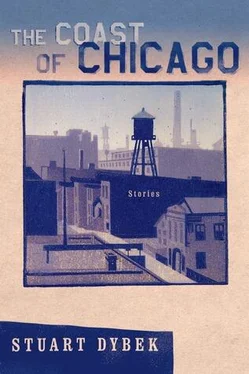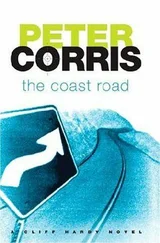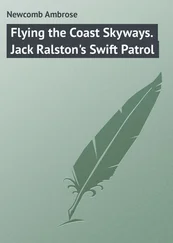Standing on the dark street Wednesday night, outside the wall again, felt like an extension of his nightmare: Manny raging almost out of control, shouting curses and insults, baiting them over the wall the way a child tortures penned watchdogs, until he had what seemed like the entire west side of the prison howling back, the guards sweeping the street with searchlights, sirens wailing toward them from both Thirty-first and Twenty-sixth.
This time they raced down the tracks that curved toward the river, picking their way in the dark along the junkyard bank, flipping rusted cables of moored barges, running through the fire truck graveyard, following the tracks across the blackened trestles where they’d once shot pigeons and from which they could gaze across the industrial prairie that stretched behind factories all the way to the skyline of downtown. The skyscrapers glowed like luminescent peaks in the misty spring night. Manny and Eddie stopped in the middle of the trestle and leaned over the railing catching their breath.
“Downtown ain’t as far away as I used to think when I was a kid.” Manny panted.
“These tracks’ll take you right there,” Eddie said quietly, “to railroad yards under the street, right by the lake.”
“How you know, man?”
“A bunch of us used to hitch rides on the boxcars in seventh grade.” Eddie was talking very quietly, looking away.
“I usually take the bus, you know?” Manny tried joking.
“I ain’t goin’ back there with you tomorrow,” Eddie said. “I ain’t goin’ back with you ever.”
Manny kept staring off toward the lights downtown as if he hadn’t heard. “Okay,” he finally said, more to himself, as if surrendering. “Okay, how about tomorrow we do something else, man?”
Nostalgia
The next night, Thursday, Eddie overslept and called in sick for work. He tried to get back to sleep but kept falling into half-dreams in which he could hear the voices shouting behind the prison wall. Finally he got up and opened a window. It was dark out. A day had passed almost unnoticed, and now the night felt as if it were a part of the night before, and the night before a part of the night before that, all connected by his restless dreams, fragments of the same continuous night.
Eddie had said that at some point: “It’s like one long night,” and later Manny had said the same thing as if it had suddenly occurred to him.
They were strung out almost from the start, drifting stoned under the El tracks before Eddie even realized they weren’t still sitting on the stairs in front of Manny’s house. That was where Eddie had found him, watching traffic, taking sips out of a bottle of Gallo into which Manny had dropped several hits of speed.
Cars gunned by with their windows rolled down and radios playing loud. It sounded like a summer night.
“Ain’t you hot wearin’ that jacket, man?” Manny asked him.
“Now that you mention it,” Eddie said. He was sweating.
Eddie took his leather jacket off and they knotted a handkerchief around one of the cuffs, then slipped the Gallo bottle down the sleeve. They walked along under the El tracks passing a joint. A train, only two cars long, rattled overhead.
“So what we doing, Eduardo?” Manny kept repeating.
“Walking,” Eddie said.
“I feel like doing something , you know?”
“We are doing something,” Eddie insisted.
Eddie led them over to the Coconut Club on Twenty-second. They couldn’t get in, but Eddie wanted to look at the window with its neon-green palm tree and winking blue coconuts.
“That’s maybe my favorite window,” he said.
“You drag me all the way here to see your favorite window, man?!” Manny said.
“It’s those blue coconuts,” Eddie tried explaining. His mouth was dry, but he couldn’t stop talking. He started telling Manny how he had collected windows from the time he was a little kid, even though talking about it made it sound as if windows were more important to him than they actually were. Half the time he was only vaguely aware of collecting them. He would see a window from a bus, like the Greek butcher shop on Halsted with its pyramid of lamb skulls, and make a mental photograph of it. He had special windows all over the city. It was how he held the city together in his mind.
“I’d see all these windows from the El,” Eddie said, “when I’d visit my busha , my grandma. Like I remember we’d pass this one building where the curtains were all slips hanging by their straps — black ones, white ones, red ones. At night you could see the light bulbs shining through the lace tops. My busha said Gypsies lived there.” Eddie was walking down the middle of the street, jacket flung over his shoulder, staring up at the windows as if looking for the Gypsies as he talked.
“Someday they’re gonna get you as a peeper, man.” Manny laughed. “And when they do, don’t try explaining to them about this thing of yours for windows, Eduardo.”
They were walking down Spaulding back toward Twenty-sixth. The streetlights beamed brighter and brighter, and Manny put his sunglasses on. A breeze was blowing that felt warmer than the air, and they took their shirts off. They saw rats darting along the curb into the sewer on the other side of the street and put their shirts back on.
“The rats get crazy where they start wrecking these old buildings,” Manny said.
The cranes and wrecking balls and urban-renewal signs were back with the early spring. They walked around a barricaded site. Water trickled along the gutters from an open hydrant, washing brick dust and debris toward the sewers.
“Can you smell that, man?” Manny asked him, suddenly excited. “I can smell the lake through the hydrant.”
“Smells like rust to me,” Eddie said.
“I can smell fish! Smelt — the smelt are in! I can smell them right through the hydrant!”
“Smelt?” Eddie said.
“You ain’t ever had smelt?” Manny asked. “Little silver fish!”
They caught the Twenty-sixth Street bus — the Polish Zephyr, people called it — going east toward the lake. The back of the bus was empty. They sat in the swaying, long backseat, taking hits out of the bottle in Eddie’s sleeve.
“It’s usually too early for them yet, but they’re out there, Eduardo,” Manny kept reassuring him, as if they were actually going fishing.
Eddie nodded. He didn’t know anything about smelt. The only fish he ate was canned tuna, but it felt good to be riding somewhere with the windows open and Manny acting more like his old self — sure of himself, laughing easily. Eddie still felt like talking, but his molars were grinding on speed.
The bus jolted down the dark block past Kedzie and was flying when it passed the narrow street between the ice house and the prison, but Eddie and Manny caught a glimpse out the back window of the railroad tracks that curved down the nameless street. The tracks were lined with fuming red flares that threw a red reflection off the concrete walls. Eddie was sure the flares had been set there for them.
Eddie closed his eyes and sank into the rocking of the bus. Even with his eyes closed he could see the reddish glare of the walls. The glare was ineradicable, at the back of his sockets. The wall had looked the same way it had looked in his dreams. They rode in silence.
“It’s like one long night,” Eddie said somewhere along the way.
His jaws were really grinding and his legs had forgotten gravity by the time they got to the lakefront. They didn’t know the time, but it must have been around 3:00 or 4:00 a.m. and the smelt fishers were still out. The lights of their kerosene lanterns reflected along the breakwater over the glossy black lake. Eddie and Manny could hear the water lapping under the pier and the fishermen talking in low voices in different languages.
Читать дальше












